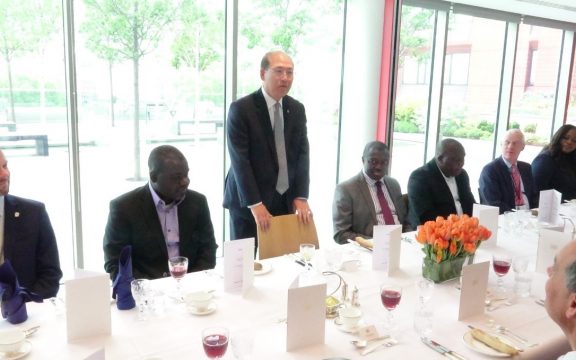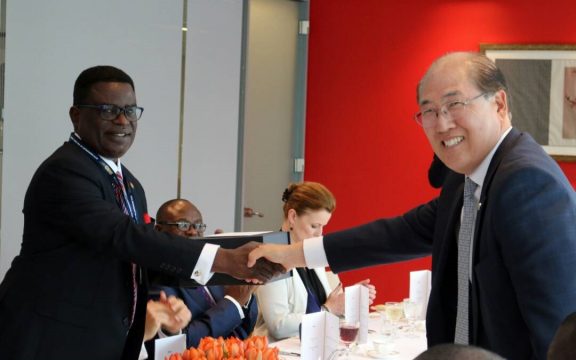Dr. Emmanuel Kofi Mbiah, the sixth Chair of the International Maritime Organization (IMO) Legal Committee and the first black man to hold that position, has stepped down as Chair, after nearly two decades of service to the IMO.
There was uncharacteristically loud applauds and a standing ovation after he delivered his farewell address. We reproduce below the full farewell address delivered at the close of the 104th Session of the Legal Committee held at the IMO headquarters in London, on the 28th April 2017.

The Secretary General,
Distinguished delegates,
The enduring traditions of the International Maritime Organization is often captured in the proverbial IMO spirit but the Legal Committee has a spirit of its own. A spirit very discernible and yet so difficult to define.
It is to this Committee that in 2010 you elected my humble self as Chair. I accepted with pride and yet in humility the confidence you reposed in me and I pledged to work with you and the Secretariat for the attainment of our lofty objectives.
Our ship has not ended its voyage. We have only come to port. It’s time to change some of the crew. My race is run. It is only appropriate that I account for my stewardship.
During the period of my stewardship, we have not developed any new convention but the success of our work is not to be measured only by the number of conventions we develop. Our work is also to be reckoned in the measures we have taken as a Committee to put in place an appropriate legal framework that guides the entire spectrum of the business of transportation by sea. That we live true to the credentials of the highest practicable standards of maritime safety and security, efficiency of navigation, the prevention and control of pollution from ships underlies our achievements.
Distinguished delegates, in that regard, I will highlight some of our accomplishments over these last couple of years.
In our quest to avoid delays, detentions and other administrative burdens, we have clarified the issues relating to the issuance of bunker certificates and I have every confidence that we will put a finality to this subject. We have provided Guidelines on the Provision of Financial Security in cases of abandonment of seafarers and Guidelines on Shipowners Responsibilities in respect of Contractual Claims for Personal Injury to or Death of Seafarers. We have also during the period under review adopted Guidelines on the Fair Treatment of Seafarers.
Our work in producing Guidelines for the Collation and preservation of evidence following an allegation of a serious crime having taken place on board a ship or following a report of a missing person from a ship and pastoral and medical care of victims is in furtherance of the objectives of the IMO.
Our work on the adoption of amendments to the 1996 Protocol on the Convention on Limitation of Liability for Maritime Claims have undoubtedly increased the limits of liability thus enhancing the opportunities for reasonable compensation. Our Guidance on the acceptance of “Blue Cards” would go a long way in reducing administrative burdens. The Guidelines on the HNS Reporting would indubitably assist countries in meeting the reporting requirements under the 2010 HNS Convention. I am happy to note that Norway has shown the way towards the ratification of the HNS. I am encouraged by that and I am hopeful that other member States will follow suit. We have also developed Guidance on Liability and Compensation for Transboundary Pollution Damage which will assist member States in their bilateral arrangements with respect to pollution incidents emanating from fixed offshore installations.
Distinguished delegates, during the period, we have witnessed the entry into force of the Protocol of 2002 to the Athens Convention relating to the carriage of Passengers and their Luggage by Sea 1974, the Nairobi International Convention on the Removal of Wrecks 2007, and the SUA Treaties of 2005 amongst others.
There is no doubt that even though no new convention has been developed within this period, a lot has been achieved to serve the objectives of the International Maritime Organization.
When the statistics show a decline in casualties, a significant drop in the number of pollution incidents and the waning of piratical attacks off the coast of Somalia, the contribution of the legal committee cannot be overlooked.
Distinguished delegates these are but the highlights of our accomplishments. What does the future hold for this Committee?
Distinguished delegates, the challenges of yesteryears are passed. New challenges confront the Legal Committee today. The Legal Committee must be proactive in anticipating gaps, examine the weaknesses in the existing international legal regime that threaten safe and secure navigation on clean oceans and use its legal mechanisms and expertise to forestall their occurrence where possible.
The legal issues with respect to Polar navigation, Autonomous Vessels, Places of Refuge, Unsafe Mixed Migration at Sea and the use of alternative fuels in ships etc., should continue to engage the attention of the Committee. The time may soon come to look again into some treaties developed by this Committee (the CLC/Fund regime has been in place already for 25 years and may need some improvements).
The task of keeping shipping more safe, secured, environmentally friendly and sustainable as well as the provision of prompt compensation to victims in all instances would continue to engage your attention. In the quest to attain the practicable highest standards, do not relent in your efforts. In this onerous endeavour, I wish you all, in language akin to our calling, calm seas and fair winds.
Distinguished delegates I cannot end this short address without telling my story. May be it will serve as footprints on the sands of time and encourage the young ones here with us today.
I do recall my days as a young and vibrant gentleman doing odd and menial jobs here in London to make ends meet. Sometimes it entailed doing three different jobs a day.
One of those jobs entailed the morning cleaning of offices. The offices I used to clean was and I believe still is, opposite this building across the River Thames.
Each morning, as the bus passed by the IMO building I observed the flags on the top of the building as they flapped in the breezy cold morning.
Each time I crossed the Lambeth Bridge, the dash of the frigid air on those wintery mornings made me look back at the flags. The colder the air, the stronger my determination to penetrate the walls of the IMO and to be a part of what goes on in there. At the International Maritime Law Institute (IMLI), I did reconnect with the flags, the cold weather and the Lambeth Bridge, instilling in me an even greater determination to be a part of what goes on within these walls.
My association with IMO began in 1993 when I started leading the Ghana delegation to the Legal Committee meetings. I took time to observe the conduct of the meetings and began making avid contributions on the floor.
My peers recommended me for the position of vice chairman and I gladly accepted it. I served as vice chairman of our Committee for 11 years working with one of the best chair persons I have ever known. Mr. Alfred Popp. Together we worked with the Committee and the Secretariat to develop a number of conventions including the HNS, the revision of the Athens Convention, the Bunkers and SUA protocols amongst others. In those days, the Legal Committee met twice a year and it is my recollection that the chairs we sit on today were green in colour.
As a young lad making my contributions from the floor, I had always aspired to serve this august Committee from the podium. If for nothing at all, to give a taint of velvet black to a predominantly white podium.
It was therefore the fulfillment of a long held dream when you graciously elected me as Chair of this august Committee. I have served for six years and today I hand over the mantle believing that I played my part. I may not have lived up to the fullest of your expectations or served with piety and perfection but at least I gave it my best shot.
Time will not permit me to pay my tribute to the many who richly deserve it, but I also know that I cannot complete an address such as this without expressing appreciation to all those who lifted me onto this pedestal. Suffice to mention Mr. Alfred Popp, Dr. Rosalie Balkin, Mrs. Monica Mbanefo and Mr. Gaetano Librando for the significant contribution they made towards the progress of my work here at IMO.
My thanks and appreciation also go to the Government of Ghana for continuously supporting my candidature and sponsoring me to these meetings.
As I draw the curtains down to almost two decades of work at the IMO, I express most profoundly my gratitude to Mr. Fred Kenny, an epitome of a gentleman, Madam Dorota Lost-Sieminska, affable and hardworking, Mr. Jan De Boer, a longtime friend and companion, and all in the Legal Affairs and External Relations Division.
To distinguished delegates, it’s been a privilege to work with you and to serve as your chair. My bounteous thanks goes to all distinguished delegates for your support and encouragement for without you this Committee would not have come this far.
To Mr. Volker Schofisch and Miss Gillian Grant our incoming pair of safe hands; when you sail through choppy waters and the clouds unfold their wings of strife, may your anchor hold and firm remain.
I cannot end without thanking our conference division and the interpreters without whom we could not have effectively communicated. To you all I say a big thank you.
May the Legal Committee grow from strength to strength.
Long Live the Legal Committee.
Long Live IMO.
Thank You for your attention.






